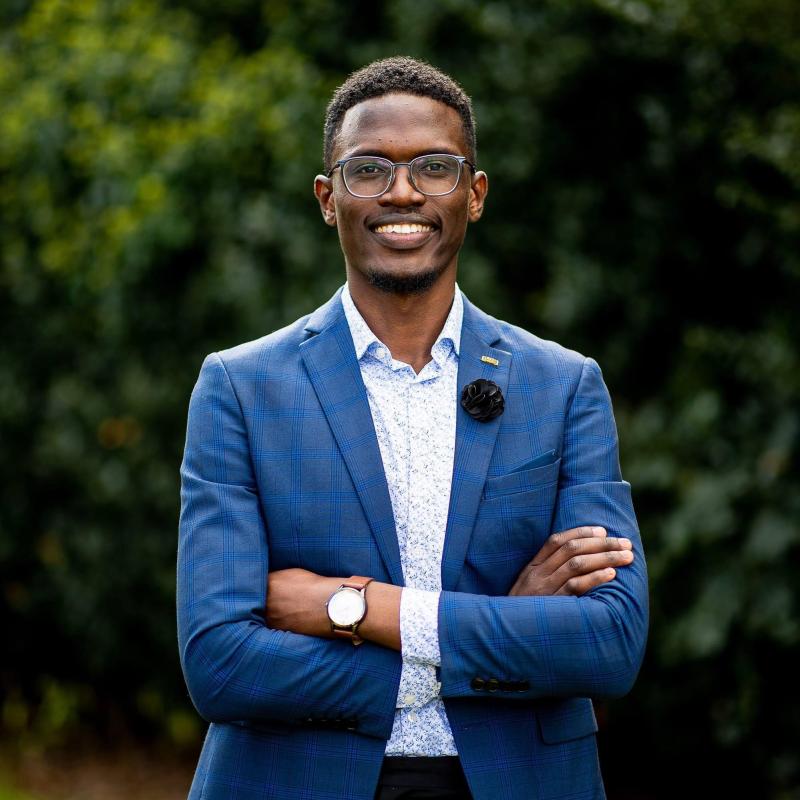Breadcrumb
“After having dealt extensively with both private and government actors at both local and international levels, it became increasingly evident that much of what tends to fail in its tracks is policy,” says Charles, reflecting on what led him to the Master of Public Policy (MPP). “If the policy isn’t as robust and evolutionary, then everything else crumbles.”
Before coming to Oxford, Charles had built a career spanning civil engineering, business and international development, including as a two-times published author. A civil engineer by training, he served as Deputy Director of Engineering for a local council in central Zambia and later led the international programme for British Water, working across Western Europe, Southeast Asia, Latin America, the Middle East and Africa. His work involved leading business development engagements, including forging and managing partnerships, and building frameworks for cooperation on water projects and ecosystems with governments and private sector organisations.
“I began to understand that policy was the linchpin that brings everything together. When policy is innovative and evidence-based, things work.”
That realisation drew Charles to the MPP. As an inaugural Policy Leadership Scholar, he saw Oxford as the ideal place to explore how effective policymaking could strengthen systems and accelerate global development.
“While I had had the good fortune of travelling quite extensively and engaging at fairly high levels, I wanted to further expand my horizons, learning how to effectively navigate the political landscape and how to make and design evidence-based policy,” he says. “The MPP was the perfect fit.”
Charles describes himself as driven by purpose. “I’ve got a philosophical belief that the greatest gift we can ever receive or give is to serve a purpose bigger than ourselves,” he says. “For me, that means promoting sustainable infrastructural development and ensuring equitable access to water and sanitation, especially for underprivileged communities.”
With nearly eight years of industry experience before Oxford, he came to the MPP ready to focus on infrastructure development policy. “If policy is designed well, you can ensure accountability across the system and attract private sector participation and investment,” he explains.
Charles describes the MPP as “a team-oriented programme”. “Constantly interacting and working out assignments with multicultural groups offered an enrichingly worthwhile learning opportunity and experience,” he says.
“The diversity of thought and case studies from almost every region really opened people’s minds to how things work elsewhere.”
Modules such as Economics for Public Policy, Evidence-Based Policy and Politics of Policymaking stood out. “Economics turned out to be foundational,” he reflects. “In our personal lives and in policy alike, it all ultimately comes down to weighing the opportunity cost of taking a decision against another. And the politics of policymaking showed how political systems play a crucial role in shaping the national and global development order.”
As a long-time debater, Charles counts one of his Oxford highlights as delivering a debate floor speech in the Oxford Union chamber. “I have long loved and appreciated civil debate and dialogue, no matter how contentious a topic may be. Because the moment we stop talking each other, mayhem easily erupts,” he reflects.
That belief in open exchange is one reason he so valued the Dean’s Forum, led by Professor Ngaire Woods, where students engaged directly with prominent figures across politics, business and academica – including former UK Prime Minister Rishi Sunak, Chancellor William Hague, LinkedIn Co-founder Reid Hoffman, Lord Gus O’Donnel, Anthropic Co-founder Dario Amodei and Google Senior Vice President James Manyika.
“Just to be in one room interacting and asking questions to people at the heart of shaping policy and global discourse was extraordinary,” Charles recalls.
He believes experiences such as these capture what makes the School distinctive.
“What BSG gives you is the ability to push boundaries, engage in tough conversations without losing intellectual integrity and honesty, while still building partnerships along the way”.
For his summer policy report placement, Charles joined Grundfos, a Danish leading global water engineering company. “While I wasn’t new to Grundfos – having been an inaugural International Water Association & Grundfos SDG 6 Fellow just over two years ago – it remains an organisation I have long admired for its culture and bold commitment to tackling global water challenges,” he says.
As a Water Access & Sustainability Associate, Charles developed a novel project centred on supporting Grundfos’s ambitious goal of reaching 300 million people globally with access to safe water by 2030.
“It was the perfect opportunity to combine my engineering experience with what I’d learned at Oxford – how to design and apply effective policy frameworks.”.
Now an MPP graduate, Charles is eager to return to the infrastructure sector with renewed perspective.
“The MPP gave me the tools to apply evidence-based policymaking more effectively and to manage partnerships in a more strategic way,” he says.
He takes with him the School’s bold approach. “BSG doesn’t just challenge the status quo – it rips through it. It’s innovative and constantly adapting to what’s going on in the world.”
Charles Shachinda was a Policy Leadership Scholar and MPP graduate of the Class of 2024.
November 2025

